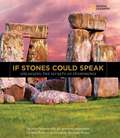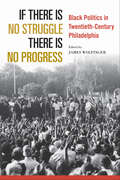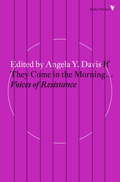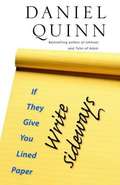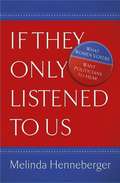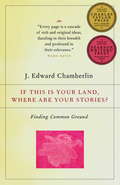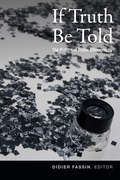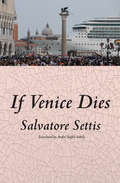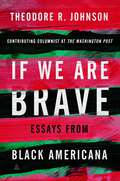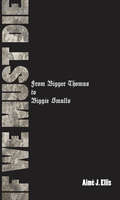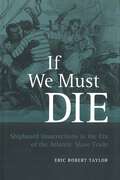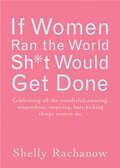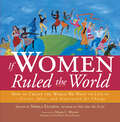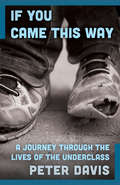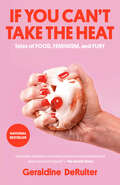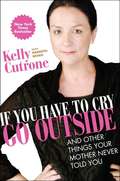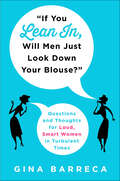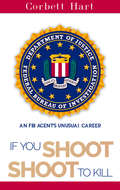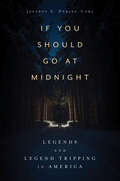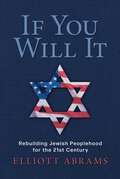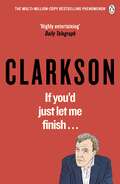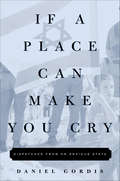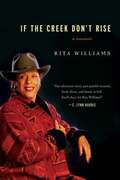- Table View
- List View
If Stones Could Speak: Unlocking the Secrets of Stonehenge
by Marc Aronson Mike Parker-PearsonWhat are the secrets of the ancient stone circle? Were the carefully placed stones a burial site, an ancient calendar, a place of Druid worship. . . or even a site of sacrifice? World-renowned archaeologist Mike Parker-Pearson has spent the last seven years on a quest to answer these and many other questions. In If Stones Could Speak, award-winning author Marc Aronson joins the research crew and records their efforts to crack Stonehenge's secrets. National Geographic helped sponsor the Riverside archeological team's mission, and now young readers can journey behind the scenes to experience this groundbreaking story first-hand, through the eyes of the experts. Mike and his team have revolutionized our understanding of Stonehenge by exploring the surrounding landscape for clues about the stones -- an idea first suggested by a visitor from Madagascar. The results have been breathtaking: The team recently unearthed the largest Neolithic village ever found in England. Marc Aronson had total access to the site, the team, and their work over two seasons of digging and brings the inspirational story of the discoveries taking place at this World Historical Site to young readers. The informative and drama-driven text includes tales of dead bodies, cremations, feasting, and ancient rituals, as well as insights into the science of uncovering the ancient past. The expert text, stunning photography, and explanatory maps and illustrations will all help young readers see this ancient monument in totally new ways, and inspire future generations of archaeological explorers.
If There Is No Struggle There Is No Progress: Black Politics in Twentieth-Century Philadelphia
by James WolfingerPhiladelphia has long been a crucial site for the development of Black politics across the nation. If There Is No Struggle There Is No Progress provides an in-depth historical analysis—from the days of the Great Migration to the present—of the people and movements that made the city a center of political activism. The editor and contributors show how Black activists have long protested against police abuse, pushed for education reform, challenged job and housing discrimination, and put presidents in the White House. If There Is No Struggle There Is No Progress emphasizes the strength of political strategies such as the “Don’t Buy Where You Can’t Work” movement and the Double V campaign. It demonstrates how Black activism helped shift Philadelphia from the Republican machine to Democratic leaders in the 1950s and highlights the election of politicians like Robert N. C. Nix, Sr., the first African American representative from Philadelphia. In addition, it focuses on grassroots movements and the intersection of race, gender, class, and politics in the 1960s, and shows how African Americans from the 1970s to the present challenged Mayor Frank Rizzo and helped elect Mayors Wilson Goode, John Street, and Michael Nutter. If There Is No Struggle There Is No Progress cogently makes the case that Black activism has long been a powerful force in Philadelphia politics.
If There Is No Struggle There Is No Progress: Black Politics in Twentieth-Century Philadelphia
by James WolfingerPhiladelphia has long been a crucial site for the development of Black politics across the nation. If There Is No Struggle There Is No Progress provides an in-depth historical analysis—from the days of the Great Migration to the present—of the people and movements that made the city a center of political activism. The editor and contributors show how Black activists have long protested against police abuse, pushed for education reform, challenged job and housing discrimination, and put presidents in the White House. If There Is No Struggle There Is No Progress emphasizes the strength of political strategies such as the “Don’t Buy Where You Can’t Work” movement and the Double V campaign. It demonstrates how Black activism helped shift Philadelphia from the Republican machine to Democratic leaders in the 1950s and highlights the election of politicians like Robert N. C. Nix, Sr., the first African American representative from Philadelphia. In addition, it focuses on grassroots movements and the intersection of race, gender, class, and politics in the 1960s, and shows how African Americans from the 1970s to the present challenged Mayor Frank Rizzo and helped elect Mayors Wilson Goode, John Street, and Michael Nutter. If There Is No Struggle There Is No Progress cogently makes the case that Black activism has long been a powerful force in Philadelphia politics.
If They Come in the Morning...
by Angela Y. DavisWith race and the police once more burning issues, this classic work from one of America’s giants of black radicalism has lost none of its prescience or powerOne of America’s most historic political trials is undoubtedly that of Angela Davis. Opening with a letter from James Baldwin to Davis, and including contributions from numerous radicals such as Black Panthers George Jackson, Huey P. Newton, Bobby Seale and Erica Huggins, this book is not only an account of Davis’s incarceration and the struggles surrounding it, but also perhaps the most comprehensive and thorough analysis of the prison system of the United State. Since the book was written, the carceral system in the US has seen unprecedented growth, with more of America’s black population behind bars than ever before. The scathing analysis of the role of prison and the policing of black populations offered by Davis and her comrades in this astonishing volume remains as pertinent today as the day it was first published.Featuring contributions from George Jackson, Bettina Aptheker, Bobby Seale, James Baldwin, Ruchell Magee, Julian Bond, Huey P. Newton, Erika Huggins, Fleeta Drumgo, John Clutchette, and others.
If They Give You Lined Paper, Write Sideways
by Daniel QuinnIn Ishmael, Daniel Quinn offered new ways of seeing and understanding human history, and our collective future. His message was transformative for millions of people, and Ishmael continues to attract tens of thousands of new readers each year. Subsequent works, such as The Story of Band in My Ishmael, expanded upon his insights and teachings, but only now does he finally tackle the one question he has been asked hundreds of times but has never taken on: "How do you do what you do?" In If They Give You Lined Paper, Write Sideways, Quinn elucidates for readers the methods behind his own thought processes, challenging and ultimately empowering them to view the world for themselves in creative, perhaps even revolutionary ways. If They Give You Lines Paper, Write Sideways also includes Quinn's never-before-published essays "The New Renaissance" and "Our Religions." There is a scientific consensus that global warming is approaching a tipping point beyond no return faster than had previously been predicted. Quinn has long portrayed humans as "a species of beings, which, while supposedly rational, are destroying the very planet they live on." So what are we to do? There has never been a plan for the future - and there never will be. But something extraordinary will happen in the next two or three decades; the people of our culture will learn to live sustainably - or not. Either way, it will be extraordinary. The sooner we understand this reality, the greater the chances that human society will transform itself so that the human race might have a future.
If They Only Listened to Us
by Melinda HennebergerSoon after the 2004 presidential election, veteran reporter Melinda Henneberger set out across the country to listen to women of all ages and occupations express their strong opinions on the major issues of our time. Over eighteen months she spoke in depth and at length with more than two hundred women in twenty states, from Massachusetts to Arizona and Oregon to Texas. She discovered how unheard women feel, how ignored and disregarded by both major parties and by most politicians. Listening to women all over the nation -- not only on what are traditionally thought of as "women's issues" but on issues of paramount importance to all Americans -- Henneberger shines a light on what women voters are thinking and how that translates into how and for whom they vote. The issues that these women focused on were Iraq, abortion, the environment, globalization (and job loss), and corruption (and lack of trust) in the government and the entire electoral process. Again and again these women of all ages, social classes, and regions returned to the matter of authenticity. And they came back again and again to their commonly held feeling that neither party takes any genuine interest in their actual lives, that politicians across the board seem, as a young waitress in Sacramento put it, "to be talking about people who don't exist. "A patient, sensitive, experienced, intelligent listener, Henneberger reports how women feel about the nation's politics and politicians. Her findings will surprise you. Knowing the answers these women give will tell you a great deal about how the next presidential and other elections will be decided.
If This Is Your Land, Where Are Your Stories?
by J. Edward Chamberlin"We need to understand our stories because our lives depend upon it." -- Ted Chamberlin. The stories we tell each other reflect and shape our deepest feelings. Stories help us live our lives -- and are at the heart of our current conflicts. We love and hate because of them; we make homes for ourselves and drive others out on the basis of ancient tales. As Ted Chamberlin vividly reveals, we are both connected by them and separated by their different truths. Whether Jew or Arab, black or white, Muslim or Christian, Catholic or Protestant, man or woman, our stories hold us in thrall and hold others at bay.Like the work of Joseph Campbell and Bruce Chatwin, this vital, engrossing book offers a new way to understand the hold that stories and songs have on us, and a new sense of the urgency of doing so. Drawing on his own experience in many fields -- as scholar and storyteller, witness among native peoples and across cultures -- Ted Chamberlin takes us on a journey through the tales of different peoples, from North America to Africa and Jamaica.Beautifully written, with insight and deep understanding, If This Is Your Land, Where Are Your Stories? examines why it is now more important than ever to attend to what others are saying in their stories and myths -- and what we are saying about ourselves. Only then will we understand why they have such power over us.
If Truth Be Told: The Politics of Public Ethnography
by Didier FassinWhat happens when ethnographers go public via books, opinion papers, media interviews, court testimonies, policy recommendations, or advocacy activities? Calling for a consideration of this public moment as part and parcel of the research process, the contributors to If Truth Be Told explore the challenges, difficulties, and stakes of having ethnographic research encounter various publics, ranging from journalists, legal experts, and policymakers to activist groups, local populations, and other scholars. The experiences they analyze include Didier Fassin’s interventions on police and prison, Gabriella Coleman's multiple roles as intermediary between hackers and journalists, Kelly Gillespie's and Jonathan Benthall's experiences serving as expert witnesses, the impact of Manuela Ivone Cunha's and Vincent Dubois's work on public policies, and the vociferous attacks on the work of Unni Wikan and Nadia Abu El-Haj. With case studies from five continents, this collection signals the global impact of the questions that the publicization of ethnography raises about the public sphere, the role of the academy, and the responsibilities of social scientists. Contributors. Jonathan Benthall, Lucas Bessire, João Biehl, Gabriella Coleman, Manuela Ivone Cunha, Vincent Dubois, Nadia Abu El-Haj, Didier Fassin, Kelly Gillespie, Ghassan Hage, Sherine Hamdy, Federico Neiburg, Unni Wikan
If Venice Dies
by Salvatore Settis&“This powerful book of cultural criticism&” by the renowned art historian &“shines a harsh light on&” a historic city&’s destruction in the name of profit (The Washington Post). What is Venice worth? To whom do its irreplaceable treasures belong? This eloquent book by art historian Salvatore Settis urgently poses these questions, igniting a new debate about urban stewardship and cultural patrimony at large. As Venice grows increasingly unaffordable and inhospitable to its own residents, Venetians are abandoning their hometown at an alarming rate. At last count, there was only one local for every 140 visitors. As it capitulates to tourists and those who profit from them, Venice&’s transformation into a lifeless shell of itself has become emblematic of the future of historic cities everywhere. In this blend of history and cultural analysis, written with wide-ranging erudition and élan, Settis makes a passionate plea to secure the soul of Venice. &“Anyone interested in learning what is really going on in Venice should read this book.&” —Donna Leon, author of My Venice and Other Essays and Death at La Fenice
If We Are Brave: Essays from Black Americana
by Theodore JohnsonThe popular Washington Post contributing opinion columnist challenges readers to have uncomfortable conversations about race, drawing on the first-person perspectives of the author and Americans from diverse viewpoints and walks of life.“The United States claims to be a nation founded on an idea,” writes Theodore R. Johnson, “but Americans—even though we nod our heads to that assertion—do not agree on what that idea is, what it should do, or who it is for.” The reality is that America is facing an existential quandary. Its citizens do not share a common vision for a democratic system in action, and even worse, do not share a common vision for what the country should be. We use the same words, but do not speak the same language.If We Are Brave is a keen-eyed and sobering examination of this rift and how race exposes and challenges traditional conceptions of national identity, national mythology, and American democracy. It is both a cultural exploration and a consideration of the American experiment through the eyes and experiences of Americans of different generations that cuts across race, ethnicity, gender, region, religion, and class. Johnson reveals the subtle ways that racialized conceptions of the American identity and the imperfect culture of democracy have hindered our ability to connect with one another, carefully piecing together first-person accounts ranging from a Rust Belt diner to the back of a police car to a jail cell.A beautiful but harsh indictment of a nation that aspires to be a more perfect union yet has consistently and painfully fallen short, If We Were Brave is a portrait of a nation at the precipice. It is an eye-opening, essential resource in a pivotal election year which will define America’s future, and a much-needed beacon of truth that sheds a bright light on who we are.
If We Must Die: From Bigger Thomas to Biggie Smalls
by Aimé J. EllisInvestigates a variety of texts in which the self-image of poor, urban black men in the U.S. is formed within, by, and against a culture of racial terror and state violence.
If We Must Die: Shipboard Insurrections in the Era of the Atlantic Slave Trade (Antislavery, Abolition, and the Atlantic World)
by Eric Robert TaylorIf We Must Die examines nearly five hundred shipboard rebellions that occurred over the course of the entire slave trade, directly challenging the prevailing thesis that such resistance was infrequent or insignificant. As Eric Robert Taylor shows, though most revolts were crushed quickly, others raged on for hours, days, or weeks, and, occasionally, the Africans captured the vessel and returned themselves to freedom. In recounting these rebellions, Taylor suggests that certain factors like geographic location, the involvement of women and children, and the timing of a shipboard revolt, determined the difference between success and failure. Taylor also explores issues like aid from other ships, punishment of slave rebels, and treatment of sailors captured by the Africans. If We Must Die expands the historical view of slave resistance, revealing a continuum of rebellions that spanned the Atlantic as well as the centuries. These uprisings, Taylor argues, ultimately helped limit and end the traffic in enslaved Africans and also served as crucial predecessors to the many revolts that occurred subsequently on plantations throughout the Americas.
If Women Ran the World, Sh*t Would Get Done: Celebrating All the Wonderful, Amazing, Stupendous, Inspiring, Buttkicking Things Women Do
by Shelly RachanowDream about the kind of world you'd run. And use the questions and pages in this book to write them down. Make your own dreams come true!!! Divided into five sections each including Real Life Stories, lists of things women do (for example, 25 Things Women Do for their Families Between 7:55 and 8:00 am!), organizations founded by women and space to write your own butt-kicking, world-running lists. Eleanor Roosevelt said, "The future belongs to those who believe in the beauty of their dreams." Shelly Rachanow's dream is to help women figure out what the world might look like if they ran it the way they - each - want it to be.Inspiring women to do what they can to create the kind of world they want their children to inherit.The future belongs to those of us who believe in the beauty of our dreams--and this is a book to help us catch our dreams and make them come true.A perfect any-occasion gift for the woman who wants more for all of us.
If Women Ruled the World: How to Create the World We Want to Live In
by Sheila EllisonWith women making up only 14 percent of Congress and with only eight women CEOs in the entire group of Fortune 500 companies, women's collective voices are clearly underrepresented. Nor are they proportionately present on the airwaves or in the op-ed pages of the country's newspapers. This book helps right that imbalance by giving women a platform for voicing their opinions, priorities, hopes, and ideas for change. The book includes short experiences, stories, thoughts, and meditations written and shared by women around the world. Authors, celebrities, experts, and politicians are included, along with soccer moms and teenage girls, creating a work that is humorous, moving, questioning, opinionated, warm, and informative as it examines what women would choose if they had a chance to participate in ruling the world. Note: A portion of this book's royalties will be donated to the Feminist Majority.
If You Came This Way
by Peter DavisWhen the acclaimed author of Where Is Nicaragua? went in search of America's growing underclass--the persistent poor--he discovered a frighteningly large segment of the population for whom our cherished notions of equal opportunity and freedom for all are nothing but a mockery. Told in starkly human terms, courageous and compassionate, If You Came This Way is Peter Davis's shattering sojourn among our hopelessly impoverished fellow Americans . . . young and old, victims and vagabonds, the struggling unemployed and the simply unemployable. Their strengths and weaknesses, fears and anxieties, needs and desires will surprise and haunt you. Praise for Peter Davis's. Where Is Nicaragua? "This superb book is not only the definitive news about Nicaragua; it makes the ongoing news finally understandable. It is as elegantly written as V. S. Naipul's The Loss of El Dorado. Mr. Davis does not make his case in the manner of the polemicist; he convinces us morally in the manner of a good novelist. " --John Irving. "Stunning piece of firsthand reportage. . . he has captured the nuance, the ambiguity, the irony and the outright comedy of life among the Sandinistas and the contras. " --J. Anthony Lukas. "A brilliant examination of the process of revolution in Central America by a most gifted writer. Wonderfully written, it is filled with pleasures and insights. --Robert Stone.
If You Can't Take the Heat: Tales of Food, Feminism, and Fury
by Geraldine DeRuiterNATIONAL BESTSELLER • From the James Beard Award–winning blogger behind The Everywhereist come hilarious, searing essays on how food and cooking stoke the flames of her feminism.&“With charm and humor, Geraldine DeRuiter welcomes us into her personal history and thus reconnects us with ourselves.&”—Mikki Kendall, New York Times bestselling author of Hood FeminismWhen celebrity chef Mario Batali sent out an apology letter for the sexual harassment allegations made against him, he had the gall to include a recipe—for cinnamon rolls, of all things. Geraldine DeRuiter decided to make the recipe, and she happened to make food journalism history along with it. Her subsequent essay, with its scathing commentary about the pervasiveness of misogyny in the food world, would be read millions of times, lauded by industry luminaries from Martha Stewart to New York Times restaurant critic Pete Wells, and would land DeRuiter in the middle of a media firestorm. She found herself on the receiving end of dozens of threats when all she wanted to do was make something to eat (and, okay fine, maybe take down the patriarchy).In If You Can&’t Take the Heat, DeRuiter shares stories about her shockingly true, painfully funny (and sometimes just painful) adventures in gastronomy. We&’ll learn how she finally got a grip on her debilitating anxiety by emergency meal–planning for the apocalypse. (&“You are probably deeply worried that in times of desperation I would eat your pets. And yes, I absolutely would.&”) Or how she learned to embrace her hanger. (&“Because women can be a lot of things, but we can&’t be angry. Or president, apparently.&”) And how she inadvertently caused another international incident with a negative restaurant review. (She made it on to the homepage of The New York Times&’s website! And she got more death threats!)Deliciously insightful and bitingly clever, If You Can&’t Take the Heat is a fresh look at food and feminism from one of the culinary world&’s sharpest voices.
If You Have to Cry, Go Outside: And Other Things Your Mother Never Told You
by Meredith Bryan Kelly CutroneKelly Cutrone has long been mentoring women on how to make it in one of the most competitive industries in the world. She has kicked people out of fashion shows, forced some of reality television's shiny stars to fire their friends, and built her own company--one of the most powerful PR firms in the fashion business--from the ground up. Through it all, she has refused to be anything but herself. Kelly writes in her trademark, no-BS style, combining personal and professional stories to share her secrets for success without selling out. Let's face it: this is a different world than the one in which our mothers grew up, and Kelly has created a real girl's guide to making it in today's world. Offering a wake-up call to women everywhere, she challenges us to stop the dogged pursuit of the "perfect life" and discover who we are and what we really want. Then she shows us how to go out there and get it. Much of our culture teaches us to muzzle our inner voice and follow the crowd; Kelly enables us to stop pretending and start truly living. With chapters on how to find your tribe (those like-minded souls who make your heart sing), how sometimes a breakdown is really a breakthrough, and how there is no such thing as perfection, Kelly also shares practical advice, such as how to create a personal brand and how sometimes you have to fake it to make it.
If You Lean In, Will Men Just Look Down Your Blouse?: Questions and Thoughts for Loud, Smart Women in Turbulent Times
by Gina BarrecaGina Barreca is fed up with women who lean in, but don't open their mouths. In her latest collection of essays, she turns her attention to subjects like bondage which she notes now seems to come in fifty shades of grey and has been renamed Spanx. She muses on those lessons learned in Kindergarten that every woman must unlearn like not having to hold the hand of the person you're waking next to (especially if he's a bad boyfriend) or needing to have milk, cookies and a nap every day at 3:00 PM (which tends to sap one's energy not to mention what it does to one's waistline). She sounds off about all those things a woman hates to hear from a man like "Calm down" or "Next time, try buying shoes that fit". "'If You Lean In, Will Men Just Look Down Your Blouse?'" is about getting loud, getting love, getting ahead and getting the first draw (or the last shot). Here are tips, lessons and bold confessions about bad boyfriends at any age, about friends we love and ones we can't stand anymore, about waist size and wasted time, about panic, placebos, placentas and certain kinds of not-so adorable paternalism attached to certain kinds of politicians. The world is kept lively by loud women talking and "'If You Lean In, Will Men Just Look Down Your Blouse?'" cheers and challenges those voices to come together and speak up. You think she's kidding? Oh, boy, do you have another thing coming.
If You Shoot, Shoot To Kill
by Corbett HartThis is the professional autobiography of a Special Agent of the FBI segmented into twenty cases in which he was largely instrumental in bringing to completion. They range from white collar criminals attempting to swindle Elvis Presley to desperados such as Billy Dean Anderson, Danny Owens and an assortment of nefarious criminals including, but not limited to swindlers, bank robbers, murderers, and an untrue wife negotiating for her husband’s assassination.
If You Should Go at Midnight: Legends and Legend Tripping in America
by Jeffrey S. Debies-CarlTonight, across America, countless people will embark on an adventure. They will prowl among overgrown headstones in forgotten graveyards, stalk through darkened woods and wildlands, and creep down the crumbling corridors of abandoned buildings. They have set forth in search of a profound paranormal experience and may seem to achieve just that. They are part of the growing cultural phenomenon called legend tripping.In If You Should Go at Midnight: Legends and Legend Tripping in America, author Jeffrey S. Debies-Carl guides readers through an exploration of legend tripping, drawing on years of scholarship, documentary accounts, and his own extensive fieldwork. Poring over old reports and legends, sleeping in haunted inns, and trekking through wilderness full of cannibal mutants and strange beasts, Debies-Carl provides an in-depth analysis of this practice that has long fascinated scholars yet remains a mystery to many observers.Debies-Carl argues that legend trips are important social practices. Unlike traditional rites of passage, they reflect the modern world, revealing both its problems and its virtues. In society as well as in legend tripping, there is ambiguity, conflict, crisis of meaning, and the substitution of debate for social consensus. Conversely, both emphasize individual agency and values, even in spiritual matters. While people still need meaningful and transformative experiences, authoritative, traditional institutions are less capable of providing them. Instead, legend trippers voluntarily search for individually meaningful experiences and actively participate in shaping and interpreting those experiences for themselves.
If You Will It: Rebuilding Jewish Peoplehood for the 21st Century
by Elliott AbramsHundreds of thousands of young Jews have drifted away from the American Jewish community and many more may follow. This book explains to Jewish parents, donors, and organizations how Jewish education, Jewish summer camping, and time spent in Israel can revive and strengthen Jewish identity.American Jewish identity is steadily weakening. National surveys show hundreds of thousands of children with one, or even two, Jewish parents not being raised as Jews by religion or to think of themselves as members of the Jewish community. And the surveys show that young American Jews are far less engaged with and supportive of Israel than their parents&’ and grandparents&’ generations—even after the Hamas attacks on October 7, 2023 and the Gaza war that followed.What can Jewish parents and organizations do to ensure that future generations of American Jews will have a strong Jewish identity? Elliott Abrams looks at the history of the American Jewish community and its relationship with Israel—from the high points of Israel&’s creation in 1948 and the Six-Day War in 1967, to the years before the Second World War and now in the 21st century when many American Jews turned away from the Jewish State. He tells American Jewish parents, donors, and organizations where to focus: on getting children a serious Jewish education, sending them to Jewish summer camps, and bringing them to Israel for weeks, semesters, or academic years. These are the building blocks for Jewish identity that work reliably for young American Jews—especially those who are not Orthodox in their faith.Abrams, author of Faith or Fear: How Jews Can Survive in a Christian America, brings together the latest survey data, his own experiences at the highest levels of the US government, his knowledge of Israel, and his role as chairman of Tikvah, the Jewish educational non-profit organization, to provide the answers to the toughest questions American Jews—especially American Jewish parents—are facing.
If You’d Just Let Me Finish
by Jeremy ClarksonClarkson is back with a brand new book of hilarious stories and observations about our gone-wrong world. ___________In November 2016 we woke up to the news that the forthright presenter of a popular television programme had become the most powerful man on the planet. His name, sadly, was not Jeremy Clarkson, but we might not have been any more surprised if it had been.Because the world seems to have taken a decidedly odd turn since Jeremy last reflected on the state of things between the covers of a book. But who better than JC to help us navigate our way through the mess?And while he's being trying to make sense of it all he's discovered one or two things along the way, including- The disabling effects of being vegan- How Blackpool might be improved by drilling a hole through it- The problem with meditation- A perfect location for rebuilding Palmyra- Why Tom Cruise can worship lizards if he wants toIt's all been a bit unsettling.But don't worry. If You'd Just Let Me Finish is Clarkson at his best. He may be as bemused, exasperated, amused and surprised as the rest of us, but in a world gone crazy, thank God someone has still got his head screwed on ...Praise for Clarkson:'Brilliant...laugh-out-loud' - Daily Telegraph'Outrageously funny...will have you in stiches' - Time Out'Very funny...I cracked up laughing on the tube' - Evening Standard
If a Place Can Make You Cry
by Daniel GordisIn the summer of 1998, Daniel Gordis and his family moved to Israel from Los Angeles. They planned to be there for a year, during which time Daniel would be a Fellow at the Mandel Institute in Jerusalem. This was a euphoric time in Israel. The economy was booming, and peace seemed virtually guaranteed. A few months into their stay, Gordis and his wife decided to remain in Israel permanently, confident that their children would be among the first generation of Israelis to grow up in peace.Immediately after arriving in Israel, Daniel had started sending out e-mails about his and his family's life to friends and family abroad. These missives--passionate, thoughtful, beautifully written, and informative--began reaching a much broader readership than he'd ever envisioned, eventually being excerpted in The New York Times Magazine to much acclaim. An edited and finely crafted collection of his original e-mails, If a Place Can Make You Cry is a first-person, immediate account of Israel's post-Oslo meltdown that cuts through the rhetoric and stridency of most dispatches from that country or from the international media. Above all, Gordis tells the story of a family that must cope with the sudden realization that they took their children from a serene and secure neighborhood in Los Angeles to an Israel not at peace but mired in war. This is the chronicle of a loss of innocence--the innocence of Daniel and his wife, and of their children. Ultimately, through Gordis's eyes, Israel, with all its beauty, madness, violence, and history, comes to life in a way we've never quite seen before.Daniel Gordis captures as no one has the years leading up to what every Israeli dreaded: on April 1, 2002, Prime Minister Ariel Sharon declared that Israel was at war. After an almost endless cycle of suicide bombings and harsh retaliation, any remaining chance for peace had seemingly died.If a Place Can Make You Cry is the story of a time in which peace gave way to war, when childhood innocence evaporated in the heat of hatred, when it became difficult even to hope. Like countless other Israeli parents, Gordis and his wife struggled to make their children's lives manageable and meaningful, despite it all. This is a book about what their children gained, what they lost, and how, in the midst of everything, a whole family learned time and again what really matters.From the Hardcover edition.
If the Creek Don't Rise: My Life Out West with the Last Black Widow of the Civil War
by Rita WilliamsWhen Rita Williams was four, her mother died. This death delivered Rita into the care of her aunt Daisy, a headstrong woman who had married the most prominent black landowner in Nebraska and spirited her sharecropping family out of the lynching South.
